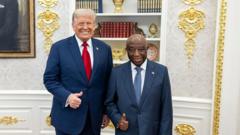Liberia, established by freed American slaves, has deep connections with the U.S. This article explores the country's fascinating history, cultural ties, and significant figures, against the backdrop of President Trump's recent remarks.**
Understanding Liberia's Historical Ties with the US in the Wake of Trump's Praise for Its President's English**

Understanding Liberia's Historical Ties with the US in the Wake of Trump's Praise for Its President's English**
A closer look at Liberia’s historical and cultural links with the United States following President Trump’s comments about its leader's English proficiency.**
Liberia, a West African nation with profound historical ties to the United States, was established in 1822 by freed African-American slaves and declared its independence in 1847. President Trump’s recent praise for President Joseph Boakai's "good English" was well-intentioned but highlighted the need for greater understanding of Liberia's unique heritage and its connections to the U.S. Here are six important facts about Liberia that underscore its rich history and relationship with America:
1. **Foundation by Freed Slaves**
Founded by freed slaves, Liberia's establishment was heavily influenced by American ideals. The descendants of these settlers, known as Americo-Liberians, formed an elite class and dominated the socio-political landscape for over a century, which fueled tensions with indigenous Liberians. It is important to note that only a quarter of Liberia’s population are Americo-Liberians, with over two dozen languages spoken across the country.
2. **Capital Monrovia**
The capital city, Monrovia, is named after James Monroe, the fifth President of the United States, reflecting its colonial roots. Influenced by American architecture, the city showcases streets named after U.S. figures, and landmarks like the John F. Kennedy Medical Center further highlight Liberia's American connections.
3. **Similar Flags**
Liberia's flag bears a striking resemblance to the American flag, featuring alternating stripes and a single star symbolizing its status as Africa's first independent republic. Designed by American-born women, this emblem captures the essence of Liberia's foundational ties to the U.S.
4. **Cultural Figures in Sports**
Timothy Weah, son of former President George Weah, is a notable American soccer player who represents both the U.S. national team and Juventus in Italy. His family's legacy encompasses both sports and politics, solidifying the connection between the U.S. and Liberia.
5. **Ellen Johnson Sirleaf**
Liberia's first elected female president, Ellen Johnson Sirleaf, has earned international acclaim for her peaceful leadership following the nation’s civil war. A Harvard graduate, her career illustrates the blend of American education and Liberian politics and social governance.
6. **Firestone and the Rubber Industry**
Firestone Liberia, a subsidiary of the American tire manufacturer, operates the world’s largest rubber plantation, which remains crucial to Liberia’s economy. However, it has faced scrutiny over human rights practices, emphasizing the complexity of foreign investments in Liberia's local economy.
In response to Trump’s remarks, Liberian Foreign Minister Sara Beysolow Nyanti noted the common misconception about African languages, pointing out Liberia's unique English intonation. Reactions from Liberians varied, with some appreciating the compliment while others expressed the need for better understanding of the nation’s linguistic and educational landscape.
Overall, Liberia's deep-rooted connections with the United States offer a rich narrative that merit attention, particularly as global dialogues shift towards more informed perspectives on African nations and their histories.





















